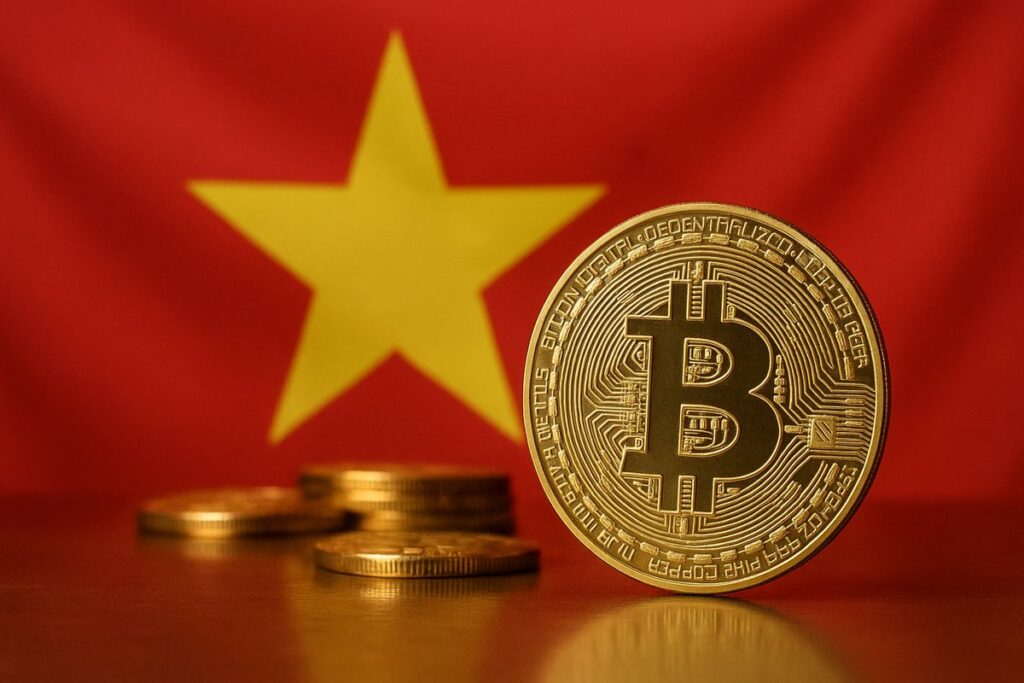Introduction
Vietnam has officially launched a five-year pilot program (2025–2030) for regulated crypto trading, marking a major step forward for its digital economy. For a country that already ranks among the top in global crypto adoption, this pilot could reshape the regional digital asset landscape. The initiative balances innovation with state control, aiming to formalize a market that has so far operated in a legal gray zone.
Key Features of the Pilot Program
1. Participation & Ownership Rules
- Only Vietnamese companies can establish and operate licensed crypto trading platforms.
- Foreign ownership is capped at 49%, ensuring domestic control while still inviting international collaboration.
2. Licensing & Exchange Requirements
- Exchanges must be licensed by Vietnamese authorities to operate legally.
- A six-month grace period will follow the issuance of first licenses, after which all unlicensed platforms will be prohibited.
3. Capital & Investor Structure
- Licensed exchanges must maintain at least 10 trillion VND (~US$379 million) in capital.
- 65% of this capital must come from institutional investors, creating a safeguard against undercapitalized or speculative ventures.
4. Currency & Transaction Restrictions
- All transactions, from issuance to trading, must be carried out in Vietnamese dong (VND).
- Crypto assets must be backed by real assets such as real estate or commodities. Securities and fiat-backed tokens are excluded.
5. Investor Access
- Both domestic and foreign investors will be able to purchase approved crypto tokens.
- However, platforms must remain majority-owned by Vietnamese entities, keeping strategic oversight within the country.
6. Legal Recognition Timeline
- Vietnam will officially recognize digital assets under law starting January 1, 2026, giving the pilot a formal legal foundation.
Why This Matters for Vietnam
Legitimizing an Active Market
Vietnam is already one of the world’s largest adopters of digital assets, with millions of citizens actively trading despite regulatory ambiguity. This pilot offers long-awaited clarity and legitimacy.
Balancing Innovation and Control
The pilot carefully opens doors to crypto activity while keeping sovereignty intact through local currency use, ownership caps, and asset-backing rules.
Protecting Investors
High capital requirements and institutional backing create a protective framework designed to prevent scams and sudden collapses that have plagued other markets.
Aligning with National Strategy
Blockchain and digital assets are among Vietnam’s identified top 11 technologies for future growth. The pilot program signals the government’s intent to integrate crypto into its broader economic modernization plan.
Risks and Trade-Offs
Market Accessibility
The high financial entry barriers may limit participation to large corporations and institutions, leaving smaller firms and innovators on the sidelines.
Enforcement Gaps
While unlicensed platforms will be banned, the effectiveness of monitoring and enforcement remains uncertain, especially given Vietnam’s historically large informal trading networks.
Innovation Limits
Restricting token backing to real assets like real estate could stifle innovation in areas such as DeFi, stablecoins, or tokenized securities.
Foreign Investment Constraints
The 49% ownership cap protects domestic oversight but may discourage deeper commitments from international firms and limit capital inflow.
Regional and Global Implications
A New Regulatory Benchmark
Vietnam’s model could serve as a blueprint for emerging markets in Southeast Asia, where countries like Indonesia, Cambodia, and Myanmar are still shaping their crypto frameworks.
Competition with Regional Hubs
Singapore and Thailand, both established crypto hubs, may adjust policies to remain competitive as Vietnam positions itself as a regulated but accessible market.
Onshore Liquidity Migration
By requiring citizens to trade only through licensed domestic exchanges, Vietnam could redirect liquidity from offshore platforms to local markets, boosting tax revenues and financial transparency.
Encouragement for Tokenization
The pilot emphasizes real-asset-backed tokens, potentially driving growth in tokenized real estate, commodities, and infrastructure projects within Vietnam.
Outlook for the Next Five Years
Short-Term (2025–2026)
- Initial licensing of exchanges and platforms.
- Market migration from unregulated offshore exchanges to domestic ones.
- Early test cases for enforcement and investor protections.
Mid-Term (2026–2028)
- Broader legal recognition of crypto assets (from Jan 2026).
- Emergence of licensed Vietnamese exchanges with institutional partnerships.
- Data collection on adoption rates, transaction volumes, and market stability.
Long-Term (2028–2030)
- Possible expansion of allowed token types, including securities or stablecoin frameworks if the pilot succeeds.
- Stronger regional positioning, potentially attracting Web3 startups and investment flows from abroad.
- A decision point on whether to extend, modify, or fully adopt the regulatory framework after the pilot concludes.

Conclusion
Vietnam’s five-year crypto trading pilot is one of the most structured approaches to digital asset regulation in Southeast Asia. By combining strict oversight, domestic control, and gradual liberalization, it sets the stage for a carefully managed transition from shadow adoption to regulated growth.
If successful, the program could transform Vietnam into a leading crypto hub in the region, inspire neighboring countries to follow suit, and pave the way for broader adoption of blockchain technology across industries. However, the balance between innovation and regulation will be the true test—and the next five years will determine whether Vietnam emerges as a pioneer or a cautionary tale in the global crypto economy.











